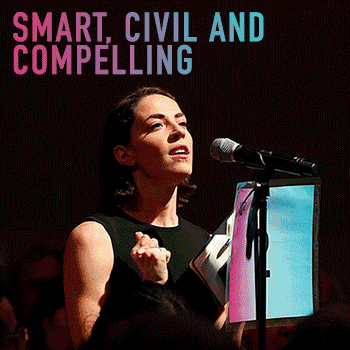What I now know about the ethics of fucking up

What I now know about the ethics of fucking up
Opinion + AnalysisRelationships
BY Alison Hill 28 MAY 2019
We’ve all fucked up before. Big mistakes and small, regrettable misdemeanours.
I have a penchant for saying things that are funny inside my head but come out all wrong. I know I’ve unintentionally offended and hurt people by blurting out the first thing that comes to mind. If I’ve become aware of it, I’ve tried to make amends. But it’s never been big, public or career ending. So, being honest, part of my interest in going along to ‘The Ethics of Fucking Up’ was schadenfreude.
I wanted to hear how Sam Dastyari and Mel Greig, who shared their stories of the ‘Chinese political donor scandal’ and the ‘Royal prank call’ had stuffed up. In truth, I wanted to revel in it just a little, to tell myself that at least it had never been that bad for me. I wanted to identify with Paul McDermott, whose fuck ups had never made the front pages or ruined lives.
I watched the crowd enter the sold-out venue in inner Sydney, thinking that every single one of these people who looked so smart, privileged and self-possessed had done at least one monumentally stupid thing in their lives. Had they come looking for redemption? For confirmation that what they did was okay? Because we all fuck up, whether we’re being naïve and thoughtless or doing something dastardly.
Pizza, wine and dark confessions
So what did I take away from a night that was variously funny, intelligent, shocking and sad, with pizza and wine thrown in for good measure?
It seems the biggest fuck ups come about when there is a combination two things: individuals being encouraged to act without first thinking through their decisions, and institutions not living by an ethical framework – or not having one at all. Add to that the speed at which we act in the tech era and it’s no wonder we’ve hurtled into our present state.
As Sam described it, ‘We’re heading backwards with our morality, with our acceptance and empathy for others, with our responsibility for the planet, while fear, selfishness and xenophobia are controlling our political decisions’.
So despite not being able to condone what he did in the ‘Chinese political donor scandal’, my heart ached for him when he described how, in the midst of the scandal, he lay in bed at 3am alone with his thoughts, realising he was solely responsible for the mess.
Rethinking forgiveness
Nobody deserves this unless they have committed some monstrous crime. I decided that I will accept mea culpas and requests for forgiveness more graciously, in my personal life and by public figures. When somebody shows true remorse, I’ll forgive them, because I’m more aware how we all fuck up from time to time, in big and small ways. It’s only human.
We love to hold individuals to account, especially when they are public figures. Perhaps we should be harder on institutions. Mel Greig told us how the broadcast organisation’s processes and ethical judgements went unquestioned during the ‘Royal prank call’.
To recap: the call to the London hospital caring for the Duchess of Cambridge ended in the suicide of nurse Jacintha Saldanha, who fell for the joke thinking it was the Queen and Prince Charles. A chain of decisions meant the prank call was broadcast in full – although Mel tried to stop this happening.
Yet Mel had to wear all the blame. Her description of the trolling she endured afterwards, which included death threats, made the room go quiet. Tears shone in the eyes of the person next to me. Public shaming, relentlessly negative and disparaging media coverage and the non-stop blast of social media are damaging people like never before. At no time has it been easier to broadcast judgment on individuals, instantly and loudly. But institutions are never made to suffer in the same way. Think banking royal commission.
How would I survive if this happened to me, I wondered?
A call to arms against the trolls
Would I be brave and resilient like Mel, and use the horrible experience to start a conversation to help other people, as she did by starting Troll Free Day? Would I have been strong enough to front up to the inquest into nurse Jacintha Saldanha’s death, look her children in the eye and say sorry? Would I stop looking for scapegoats and accept blame, as Sam did, learning to live with what he called ‘the darkest shit in the world’?
As always, a discussion about ethics goes on long after the lights have been turned off. Listening to this conversation about the ethics of fucking up has encouraged me to start conversations about it with friends and family. I realised we all draw the line about what we will and won’t forgive somewhere different, one of the things that defines our personal ethics.
The crowd drifted into the street to the sounds of Paul Kelly’s I’ve Done All the Dumb Things and Cher’s If I Could Turn Back Time. Neither has ever been on my playlist, but I heard them in a new way. Opening your ears to things you think you already know is good thing.
I’ll certainly go back for The Ethics Centre’s conversations on desire, lying, courage and nudity.
MOST POPULAR
ArticleBeing Human
Putting the ‘identity’ into identity politics
ArticleHEALTH + WELLBEING
Parent planning – we should be allowed to choose our children’s sex
Article
Ethics Explainer: Respect
ArticleBeing Human
Praying for Paris doesn’t make you racist
The transformative power of praise

The transformative power of praise
Opinion + AnalysisBusiness + LeadershipRelationships
BY Professor Bob Murray 11 MAY 2019
What is it about the legal industry that makes it so depressing? Well, it is not the work – but it could be exhaustion mixed with a lack of control about how much work they can handle and a shortage of appreciation from their bosses.
Psychologist and a scientist in behavioural neurogenetics, Bob Murray, says human beings are designed to work as little as 10 hours per week.
“If we work for more than 10 hours a week, it becomes stress,” he told a recent seminar in Sydney.
While that may seem an extreme position at first glance, it is important to understand what Professor Murray means by “work”.
“Work” is the stuff we do that is a grind. It is, perhaps, the administrative work that takes us away from the tasks that are meaningful or enjoyable.
“Work means not necessarily enjoying yourself, not necessarily relating. Human beings are relationship-forming animals. We are driven to surround ourselves with a network of supportive relationships and we can work hard and long… providing that we do it in the company of other people that we actually like, and that we enjoy the process of doing things with them.
“It’s not a question of how many hours you work. It’s whether you enjoy the process of doing that work. And whether you enjoy the people that you do it with”.
Murray said people come to work to be part of a tribe and to learn.
“So people in law firms are willing to stay there for long hours, providing they’re enjoying the process of learning what they’re doing,” he said.
Murray says 30 percent of all lawyers think about suicide once a year and 40 percent are clinically depressed.
A national survey of almost 1000 lawyers finds that excessive job demands, minimal control over workload and spillover of work commitments into personal life are some of the work-related factors correlated with poorer mental health outcomes.
“Concerns about the structure and culture of legal practice in Australia are also highlighted,” say the authors of the study, Lawyering Stress and Work Culture: An Australian Study, 2012-2013.
He says one relatively simple thing that employers and managers can do is to praise their people. However, only around 5 percent of people get praised once a day.
Praise is powerful because of its effect on the “feel good” chemicals we produce, like dopamine, which helps our brains work faster, smarter, and more creatively.
However, poorly given praise tends to antagonise people. Murray says there are three elements to effective praise:
What: The giver has to be specific about what they are praising. A generic “well-done team” can have the opposite effect.
How: This is the effort or the way someone has gone about something. It is the kind of praise you may give a child who comes last in a race, but stuck it out to the end, gave it their best effort and didn’t let the team down. It is not necessarily tied to success, but encourages and rewards the right behaviours.
Who: This is praise for the relationship. “ I really enjoy working with you. It’s great to have you as part of you of my team.” Murray says this kind of praise is less used in law firms than other kinds – but is the most powerful.

This article was originally written for The Ethics Alliance. Find out more about this corporate membership program. Already a member? Log in to the membership portal for more content and tools here.
Ethics in your inbox.
Get the latest inspiration, intelligence, events & more.
By signing up you agree to our privacy policy
You might be interested in…
Opinion + Analysis
Relationships
How to respectfully disagree
Big thinker
Climate + Environment, Relationships
Big Thinker: Ralph Waldo Emerson
WATCH
Relationships
Purpose, values, principles: An ethics framework
Opinion + Analysis
Business + Leadership
Market logic can’t survive a pandemic
BY Professor Bob Murray
Professor Bob Murray, is a principal at consultancy Fortinberry Murray, was speaking on a panel, hosted by The Legal Forecast and Clarence Workplaces for Lawyers in Sydney.
Are we prepared for climate change and the next migrant crisis?

Are we prepared for climate change and the next migrant crisis?
Opinion + AnalysisClimate + EnvironmentPolitics + Human Rights
BY Kate Prendergast 7 MAY 2019
A powerful infographic published in 2014, predicted how many years it would take for a world city to drown.
It used data from NASA, Sea Level Explorer, and the Intergovernmental Panel on Climate Change. Venice will be the first to go under apparently, its canals rising to wetly throttle the city of love. Amsterdam is set to follow, Hamburg next.
Other tools play out the encroachment of rising tides on our coasts. This one developed by EarthTime shows Sydney airport as a large puddle if temperatures increase by four degrees. There’s also research suggesting our ancestors may one day look down to see fish nibbling on the Opera House sails.
Climate change refugees will become reality
Sea level rise is just one effect of anthropogenic climate change that would make a place uninhabitable or inhospitable to humankind. It’s also relatively slow. Populations in climate vulnerable hotspots face a slew of other shove factors, too.
Already, we are seeing a rising frequency of extreme weather events. Climate change was linked to increasingly destructive tropical cyclones in a report published in Nature last year, and Australia’s Climate Council attributed the same to earlier and more dangerous fire seasons. Rapidly changing ecosystems will impact water resources, crop productivity, and patterns of familiar and unfamiliar disease. Famine, drought, poverty and illness are the horsemen saddling up.
Some will die as a result of these events. Others, if they are able, will choose to stay. The far sighted and privileged may pre-empt them, relocating in advance of crisis or discomfort.
These migrants can be expected to move through the ‘correct’ channels, under the radar of nativist suspicion. (‘When is an immigrant not an immigrant?’ asks Afua Hirsch. ‘When they’re rich’.)
But many more will become displaced peoples, forcibly de-homed. Research estimates this number could be anywhere between 50 million and 1 billion in the 21st century. This will prompt new waves of interstate and international flows, and a resultant redistribution and intensification of pressures and tensions on the global map.
How will the world respond?
Where will they go? What is the ethical obligation of states to welcome and provide for them? With gross denialism characterising global policies towards climate change, and intensifying hostility locking down national borders, how prepared are we to contend with this challenge to come?
“You can’t wall them out,” Obama recently told the BBC. “Not for long.”
While interstate climate migration (which may already be occurring in Tasmania) will incur infrastructural and cultural problems, international migration is a whole and humongous other ethical conundrum. Not least because currently, climate change migrants have almost no legal protections.
Is a person who moves because of a sudden, town levelling cyclone more entitled to the status of climate migrant or refugee (and the protection it affords) than someone who migrates as a result of the slow onset attrition of their livelihood due to climate change?
Who makes the rules?
Does sudden, violent circumstance carry a greater ethical demand for hospitality than if, after many years of struggle, a Mexican farmer can no longer put food on the table because his land has turned to dust? Does the latter qualify as a climate or economic migrant, or both?
Somewhat ironically (and certainly depressingly), the movement of people to climate ‘havens’ will place stress on those environmental sanctuaries themselves, potentially leading to concentrated degradation, pollution and threat to non-human nature. (On the other hand, climate migration could allow for nature to reclaim the places these migrants have left.)
There is also the argument that, once migrants from developing countries have been integrated into a host country, their carbon footprint will increase to resemble that of their new fellow citizenry – resulting in larger CO2 emissions. From this perspective, put forward by Philip Cafaro and Winthrop Staples, it is in the interests of the planet for prosperous countries to limit their welcome.
Not that privileged populations need much convincing. Jealous fear of future scarcity, a globalisation inflamed resentment towards the Other, a sense that modernity has failed to deliver on its promise of wholesale bounty: all these are conspiring to create increasingly tribalised societies that enable the xenophobic agendas of their governments. A recent poll showed that 46 percent of Australians believe immigration should be reduced, a percentage consistent with attitudes worldwide.
A divided world
In the US, there’s Trump’s grand ‘us vs them’ symbol of a wall. As reported in the Times, German lawmakers are comparing refugees to wolves. In Italy, tilting towards populism and the right, a mayor was arrested after transforming his small town into a migrant sanctuary.
Closer to home, in a country where the 27 years without recession could be linked to immigration, there’s Scott Morrison’s newly proposed immigration cuts. There’s Senator Anning blaming the Christchurch massacre on Muslim immigration. There’s the bipartisan support for the prospects, wellbeing and mental health of asylum seekers to deteriorate to such an extent, the UN human rights council described it as ‘massive abuse’.
Yet the local effects of climate change don’t have a local origin. Causality extends beyond borders, piling miles high at the feet of industrialised countries. Nations like the US and Australia enjoy high standards of living largely because we have been pillaging and burning fossil fuels for more than a century. Yet those least culpable will bear the heaviest cost.
This, argues the author of a paper published in Ethics, Policy and Environment, warrants a different ethical framework than that which applies to other kinds of migration. He concludes that industrialised nations “have a moral responsibility … to compensate for harms that their actions have caused”.
This responsibility may include investing in less developed countries to mitigate climate change effects, writes the author. But it also morally obliges giving access, security and residence to those with nowhere else to go.
MOST POPULAR
ArticleBeing Human
Putting the ‘identity’ into identity politics
ArticleHEALTH + WELLBEING
Parent planning – we should be allowed to choose our children’s sex
Article
Ethics Explainer: Respect
ArticleBeing Human
Praying for Paris doesn’t make you racist
BY Kate Prendergast
Kate Prendergast is a writer, reviewer and artist based in Sydney. She's worked at the Festival of Dangerous Ideas, Broad Encounters and Giramondo Publishing. She's not terrible at marketing, but it makes her think of a famous bit by standup legend Bill Hicks.
Corruption, decency and probity advice

Corruption, decency and probity advice
Opinion + AnalysisBusiness + LeadershipPolitics + Human RightsSociety + Culture
BY David Burfoot 6 MAY 2019
Corruption and probity are hot topics in Australia’s public sector. Even a cursory glance at recent cases brought before corruption watchdogs shows this.
The long running stories and court cases that follow have become a staple of national news bulletins. Any time a state asset is built, sold or disposed of, there are serious questions to be asked.
Probity – which is a corporate noun for ethics or honesty and decency – has established its place in the architecture of technical services that assess, assure and measure high-risk public sector projects. Probity advising and auditing is crucial when how a project is executed is just as important as any intended outcome.
As the line separating public and private sector accountabilities becomes less clear, non-government actors are increasingly looking to probity professionals to help ensure – and show – integrity in their dealings. However, before doing so it is important the probity professionals themselves improve the integrity of their process and gain a more sophisticated understanding of ethical frameworks.
Probity services are provided both by large accounting firms and a growing band of smaller boutique operators. Probity plans (documents that set out how the project will be run to ensure the integrity of the process) are now a mandatory requirement for many public projects.
Probity professionals use a number of lenses to monitor and promote ethical decision making in execution, typically through the following fundamentals:
Value for money: Was the market tested adequately to ensure an organisation was achieving the most competitive result, which made the best use of resources?
Conflicts of interest and impartiality: Were processes in place to manage any actual, perceived or potential conflicts of interests?
Accountability and transparency: Was an auditable trail maintained to provide evidence of the integrity of the process? Was enough information made available to promote confidence – for example, were selection criteria and time lines for decision making adequately communicated?
Confidentiality: When sensitive information from stakeholders is received, such as private or business-in-confidence information, was there a process in place to identify and protect this information?
The growth of probity services over the last 30 years undoubtedly reflects their ability to add value to projects. However, over that same period there has been concern that practitioners have at times diminished, rather than promoted, probity fundamentals. Some of the critical factors include:
- Relying too heavily on compliance monitoring at the expense of ethical considerations
- Allowing their duties to be too narrowly defined by clients
- Lacking the confidence to challenge impropriety
- Allowing themselves to be “shopped” (much like “legal advice shopping,” clients can go from one probity advisor to another until they get the advice they want).
There is also concern that public sector agencies can overuse these services, having the effect of “contracting out” their probity obligations in their regular operations.
To some extent these are symptoms of the unregulated nature of probity services. There are no formal qualifications required for probity advisors and auditors and no professional standard governing them.
Their difference from traditional audits or investigations has led to some misunderstanding of their role and judgements which can lead to unfair criticism of probity professionals, but also to exploitation by both clients and probity practitioners.
To tackle these problems and prepare for a broader role in guiding business dealings, probity practitioners need to acknowledge their own industry’s need for an ethical framework and an increasingly robust standard for professional practice.
This framework would acknowledge their implied obligation to society to be more than a mere compliance check, and, on behalf of the average Joe on the street, to be the one in the room to ask a simple pub test question: after all the boxes have been ticked, does it look and sound like an ethical process?
To do this, the profession needs to imagine its duty in broader terms than self-interest or the interest of clients, but to society in general, in line with other professions tasked with acting in the public interest.
For some time, probity professionals have used policy documents such as the NSW Code of Practice for Procurement to gauge the ethical performance of government projects. However, as their duty and work expands to different sectors and in line with changing community expectations, they will need to be able to identify the ethical frameworks peculiar to those sectors and to the organisations they are commissioned by.
Used effectively, an ethical framework is the foundation of an organisation’s culture.
When requested to provide probity related advice, The Ethics Centre includes the ethical framework amongst its list of fundamentals. This allows our clients to do more than tick boxes. It allows them to assess whether they have lived up to their ethical obligations, the values they proport to uphold and their promise to the community.
In a world in which trust is in deficit, these are important skills to have.
Ethics in your inbox.
Get the latest inspiration, intelligence, events & more.
By signing up you agree to our privacy policy
You might be interested in…
Opinion + Analysis
Society + Culture, Business + Leadership
How to tackle the ethical crisis in the arts
Opinion + Analysis
Relationships, Society + Culture
Meet David Blunt, our new Fellow exploring the role ethics can play in politics
Opinion + Analysis
Politics + Human Rights, Relationships
Would you kill baby Hitler?
Opinion + Analysis
Business + Leadership
Has passivity contributed to the rise of corrupt lawyers?
BY David Burfoot
David has worked in the not-for-profit, public and private sectors domestically and internationally for organisations as diverse as the United Nations Development Program, Deloitte, the NSW Independent Commission Against Corruption and Sydney University. He has been an anti-corruption specialist with a number of government agencies and held senior positions responsible for corporate planning, change and internal communications.
Australia, it’s time to curb immigration

Australia, it’s time to curb immigration
Opinion + AnalysisClimate + EnvironmentPolitics + Human Rights
BY Satya Marar 3 MAY 2019
A majority of Australians welcome immigrants. So why then do opinion polls of young and old voters alike across the political divide, now find majority support for reducing our immigration intake?
Perhaps it could be for the same reason that faith in our political system is dwindling at a time of strong economic growth. Australia is the ‘lucky country’ that hasn’t had a recession in the last 28 years.
Yet we’ve actually had two recessions in this time if we consider GDP on a per-capita basis. This, combined with stagnant real wage growth and sharp increases in congestion and the price of housing and electricity in our major cities, could explain why the Australian success story is inconsistent with the lived experience of so many of us.
The decline of the Australian dream?
Our current intake means immigration now acts as a ponzi scheme.
The superficial figure of a growing headline GDP fuelled by an increasing population masks the reality of an Australian dream that is becoming increasingly out of reach for immigrants and native-born Australians alike.
We’ve been falsely told we’ve weathered economic calamities that have stunned the rest of the world. When taken on a per-capita basis, our economy has actually experienced negative growth periods that closely mirror patterns in the United States.
We’re rightly told we need hardworking immigrants to help foot the bill for our ageing population by raising productivity and tax revenue. Yet this cost is also offset when their ageing family members or other dependents are brought over. Since preventing them from doing so may be cruel, surely it’s fairer to lessen our dependence on their intake if we can?
A lack of infrastructure
Over 200,000 people settle in Australia every year, mostly in the major cities of Sydney and Melbourne. That’s the equivalent of one Canberra or greater Newcastle area a year.
Unlike the United States, most economic opportunities are concentrated in a few major cities dotting our shores. This combined with the failures of successive state and federal governments to build the infrastructure and invest in the services needed to cater for record population growth levels driven majorly by immigration.
A failure to rezone for an appropriate supply of land, mean our schools are becoming crowded, our real estate prohibitively expensive, our commutes are longer and more depressing, and our roads are badly congested.
Today, infrastructure is being built, land is finally being rezoned to accommodate higher population density and more housing stock in the outer suburbs, and the Prime Minister has made regional job growth one of his major priorities.
But these issues should have been fixed ten years ago and it’s increasingly unlikely that they will be executed efficiently and effectively enough to catch up to where they need to be should current immigration intake levels continue for the years to come.
Our governments have proven to be terrible central planners, often rejecting or watering down the advice of independent expert bodies like Infrastructure Australia and the Productivity Commission due to political factors.
Why would we trust them to not only get the answer right now, but to execute it correctly? Our newspapers are filled daily with stories about light rail and road link projects that are behind schedule.
All of it paid for by taxpayers like us.
Foreign workers or local graduates?
Consider also the perverse reality of foreign workers brought to our shores to fill supposed skill gaps who then struggle to find work in their field and end up in whatever job they can get.
Meanwhile, you’ll find two separate articles in the same week. One from industry groups cautioning against cutting skilled immigration due to shortages in the STEM fields. The other reporting that Australian STEM graduates are struggling to find work in their field.
Why would employers invest resources in training local graduates when there’s a ready supply of experienced foreign workers? What incentive do universities have to step in and fill this gap when their funding isn’t contingent on employability outcomes?
This isn’t about nativism. The immigrants coming here certainly have a stake in making sure their current or future children can find meaningful work and obtain education and training to make them job ready.
There’s only one way to hold our governments accountable so the correct and sometimes tough decisions needed to sustain our way of life and make the most of the boon that immigration has been for the country, are made. It’s to wean them off their addiction to record immigration levels.
Lest the ponzi scheme collapse.
And frank conversations about the quantity and quality of immigration that the sensible centre of politics once held, increasingly become the purview of populist minor parties who have experienced resurgence on the back of widespread, unanswered frustrations about unsustainable immigration that we are ill-prepared for.
This article was produced in association with IQ2: Should Australia curb immigration? With powerful arguments presented at both ends of the spectrum, it was a debate that raised issues from urban planning to government policy, environmental impacts to economic advantages and more.
MOST POPULAR
ArticleBeing Human
Putting the ‘identity’ into identity politics
ArticleHEALTH + WELLBEING
Parent planning – we should be allowed to choose our children’s sex
Article
Ethics Explainer: Respect
ArticleBeing Human
Praying for Paris doesn’t make you racist
BY Satya Marar
Satya Marar is an Indian-born, Sydney based writer, public commentator and Director of Policy at the Australian Taxpayers’ Alliance. He took part in the IQ2 debate, ‘Curb Immigration’
The dangers of being overworked and stressed out

The dangers of being overworked and stressed out
Opinion + AnalysisBusiness + Leadership
BY Fiona Smith 1 MAY 2019
If anyone has a visceral understanding of how high-pressure work environments make mincemeat from young graduates, it is Georgie Dent. Her first job as a young lawyer ended in a nervous breakdown and two weeks in a psychiatric hospital.
Now a well-known journalist and advocate for women, Dent is also supporting her husband (a surgeon-in-training) through the brutal demands of his work, is raising three young daughters and has just published a book (Breaking Badly) about how things fell apart during her 18-months of working in a top law firm, 12 years ago.
“I think that there is the same sort of cultural expectation in law and medicine, that you will suck up absolutely everything and you will work around the clock,” she says.
When Dent looks back at her time as a lawyer, she acknowledges that an unworkable workplace was just one element in her breakdown. She also had to deal with her anxious personality and the ravages of Crohn’s Disease – a life-long gastrointestinal disorder.
“I think, for me, it probably wasn’t avoidable. I actually think, no matter what job I had taken, I was headed for some sort of breakdown. Being in a particularly stressful job with really long hours certainly didn’t help me physically… and then mentally,” she says.
Dent’s first six-month rotation in the law firm was with a Partner who was regarded as a genius and “rainmaker”, but was actually a shouting bully. As she details in her book:
“Almost anyone who has done any work inside a large law firm will have a tale or two about a tyrannical partner. These men and women are feared and revered in equal measure: they are not afraid of throwing phones and think nothing of publicly dressing down members of their team, they expect an immediate response to every email regardless of the time it’s dispatched, and generally have everyone in their vicinity living on a knife’s edge.
“The man I worked for had had nine members of staff leave in the six months before I joined – and it was a team of six. He went hot and cold, and was aggressive, void of self-awareness and really difficult to please.”
A lack of autonomy
Dent stayed the course and then moved onto a team that was welcoming and collegiate, but the stress had exacerbated her Crohn’s, which only added to her anxiety.
Juniors such as Dent, as she was then, had been the stars of their schools and universities, but found their achievements and intellect counted for little at work.
“As the firm’s underlings, we operated at the whims of partners, senior lawyers and clients. The higher a person climbs in a law firm the greater autonomy they secure. We were on the bottom rung, which meant no autonomy at all.
“We were so lowly, in fact, that we were rarely given a glimpse of the ‘big picture’. Instead, we were often asked to complete tasks without any context, which meant we were regularly blindsided when it came to the next step.
“Having a substantive task doled out at 5.30pm with a tight turnaround wasn’t unusual – in fact, it was practically expected. The salt in the wound was when this kind of task was handed to you at the end of a quiet day, after you had been hanging around and asking for work since morning, unsure of how you could possibly meet your billable target without anything to do.”
Dent sees this lack of control as a factor in burn-outs among lawyers and doctors.
Unsafe hours for doctors
Reconstructive plastic surgeon, Neela Janakiramanan, has written about the pressures on young doctors in a column for Women’s Agenda(of which Dent is a contributing editor).
“As an intern, I learned that it is considered acceptable to work eighty hours in a week if you have the following week off, and not be paid overtime for the week worked because the average across the fortnight is only forty,” writes Janakiramana.
Janakiramana’s longest fortnight was 204 hours in twelve consecutive days, “with the majority of it on call, in the midst of a job where the average was 180 hours a fortnight. I was in my third trimester of pregnancy”.
It is worth noting that the suicide rate for doctors is twice that of the general population and a 2016 audit found 53 per cent of public hospital doctors are working unsafe hours. Mental health starts to decline after someone has worked more than 39 hours per week, according to research.
After leaving the law firm to recuperate, Dent found herself in another occupation often regarded as high-pressure – journalism – for BRW magazine. Even though she was again starting at the bottom, Dent found the experience enlightening.
“It was just so different to me, culturally,” she says.
“In editorial meetings, people were allowed to speak. In a law firm… you don’t speak unless you’re spoken to. As a junior, you’re not even allowed to send an email.
“[In law firms] You’re on the leash so much and, culturally, that creates a different dynamic. I found it very refreshing to walk into other workplaces where you can still sit around the table and pitch ideas and contribute to conversations without thinking through every single word that you say.”
Longer (hours) does not equate to ‘better’
When it comes to working hours, many studies show that longer work weeks do not improve productivity. They may even make people less productive.
Dent points to the experience of Perpetual Guardian in New Zealand, which offered its 250 staff a four-day work week, while retaining their full-time wages. A study of the impact of the initiative reported lower stress levels, higher levels of job satisfaction and an improved sense of work-life balance.
Company founder, Andrew Barnes, told The Guardian: “For us, this is about our company getting improved productivity from greater workplace efficiencies… there’s no downside for us”.
Dent supports the idea that law firms “gear themselves” around efficiency, rather than time worked.
“I think then across every industry, every field, I think we need to get a recognition that we work incredibly long hours and we have to look at how that is impacting our lives as well as that work,” she says.
“It’s easy to fall into that trap of thinking that, in this line of work [law], we have to be available all the time and that’s the only way we can deliver value to clients. I just don’t necessarily think that’s true. And I think that it’s worth being a little bit bold.”

This article was originally written for The Ethics Alliance. Find out more about this corporate membership program. Already a member? Log in to the membership portal for more content and tools here.
Ethics in your inbox.
Get the latest inspiration, intelligence, events & more.
By signing up you agree to our privacy policy
You might be interested in…
Opinion + Analysis
Business + Leadership, Science + Technology
5 dangerous ideas: Talking dirty politics, disruptive behaviour and death
Opinion + Analysis
Business + Leadership
Managing corporate culture
Explainer
Business + Leadership, Politics + Human Rights
Ethics Explainer: Liberalism
Opinion + Analysis
Business + Leadership, Health + Wellbeing, Relationships
Ending workplace bullying demands courage
BY Fiona Smith
Fiona Smith is a freelance journalist who writes about people, workplaces and social equity. Follow her on Twitter @fionaatwork
Overcoming corruption in Papua New Guinea

Overcoming corruption in Papua New Guinea
Opinion + AnalysisBusiness + LeadershipClimate + EnvironmentSociety + Culture
BY David Burfoot 30 APR 2019
Papua New Guinea is known as one of the most corrupt countries in the world.
Yet through delivering ethical leadership training to public officials there, The Ethics Centre is seeing a natural aptitude for ethics that government and corporations are struggling to nurture in Australia.
It has one of the most diverse cultures with over 850 known languages spoken. It is rich in minerals, gas and forestry.
Yet despite its natural wealth, Papua New Guinea suffers the ‘paradox of plenty’ or ‘resource curse’. This is where countries endowed with rich natural resources struggle to make effective use of them and end up with lower levels of economic development than countries without those natural resources. How could this be?
PNG is plagued by what the United Nations Development Program claim to be the most crippling ethical failure in international development: corruption.
Transparency International ranks PNG as one of the most corrupt countries in the world. Its PNG chapter states, “There is massive disrespect for rule of law in Papua New Guinea. Public servants and citizens alike lack the integrity to adhere to proper processes and respectful ways of conduct”.
Such assessments may however overlook some important strengths amongst PNG’s people, ones which may in time prove instrumental in corruption control.
The Ethics Centre delivers a broad range of ethics educational programs, including one package being delivering to senior PNG Officials, funded by Department of Foreign Affairs and Trade.
Contrary to what some might guess, this training does not lecture participants about what is ‘right’ and ‘wrong’. Instead, it identifies what is meant by ‘ethics’, what gets in the way of ethical decision making and mechanisms to integrate ethics into the governance of organisations and their various activities.
More research is showing the power of ethical leadership in building strong organisational cultures that are able to resist ethical failure (like corruption) and enhance corporate performance.
The program links personal and organisational ethical frameworks. Different factors are identified as influential to the ‘PNG mindset’ and decision making of public officials:
- Christian values
- Clan values
- Government values
- Global values
At times the training also includes instruction on specific techniques, such as conflicts of interest management and probity reviewing.
Instruction in these skills is growing in demand in Australia and abroad as government and corporations alike search for ways of winning back public trust and confidence.
In contrast to the past problematic approach of corporate leaders to ethics in the West, that is, as non-essential and nice-to-have, PNG officials demonstrated a sophisticated appreciation of the instrumental and social value of ethics in administration.
As facilitators, we learnt much about the ethical dilemmas and challenges confronting PNG officials, often on a scale many Australians would have difficulty comprehending. A person’s relationship with a clan, family, profession and government at times present complex dilemmas.
Yet these officials’ enthusiasm for honouring all these duties and appreciating their tangible and intangible worth appears undiminished. They appear to have missed the economic rationalist memo. And this is a real strength for PNG, something some commentators may be overlooking.
To help preserve this strength and to take advantage of it in countering corruption and other PNG challenges, The Ethics Centre is talking to potential partners about co-designing content with local officials and developing a train-the-trainer program.
We know local officials are enthusiastic for more of this training, indeed, it was the PNG Department of Personnel Management who requested education in ethical decision making for public servants. The average Net Promotor Score from participants on the program is 88 (of a score between -100 and +100), indicating high levels of satisfaction. We look forward to continuing our work with the Australian Government and the Government and people of PNG on this important initiative.
Lead photo by Stefan Krasowski
Ethics in your inbox.
Get the latest inspiration, intelligence, events & more.
By signing up you agree to our privacy policy
You might be interested in…
LISTEN
Health + Wellbeing, Society + Culture
Life and Debt
Opinion + Analysis
Business + Leadership
A radical act of transparency
Reports
Business + Leadership
Thought Leadership: Ethics in Procurement
Opinion + Analysis
Business + Leadership
Sylvie Barbier and Rufus Pollock on failure and fostering a wiser culture
BY David Burfoot
David has worked in the not-for-profit, public and private sectors domestically and internationally for organisations as diverse as the United Nations Development Program, Deloitte, the NSW Independent Commission Against Corruption and Sydney University. He has been an anti-corruption specialist with a number of government agencies and held senior positions responsible for corporate planning, change and internal communications.
Ethical concerns in sport: How to solve the crisis

Ethical concerns in sport: How to solve the crisis
Opinion + AnalysisBusiness + LeadershipHealth + WellbeingSociety + Culture
BY David Burfoot 28 APR 2019
The Ethics Centre (TEC) has often been called upon to assist sporting organisations with ethical crisis.
The Ethics Centre recently took advantage of an opportunity to discuss two recent cases regarding ethical sport dilemmas with a group of HR Sport Executives. It was an enlightening experience and we’d like to share it with you.
As a reminder, TEC undertook two high-profile reviews of sporting organisations over the last 18 months, the Australian Olympic Committee (AOC) and Cricket Australia (CA).
The first of these explored the comparison between sportsmanship and the ‘pragmatic’ or even gamesmanship* approach to its administration. Bringing the two approaches was problematic and culminated in disenchantment, frustration and an organisational culture that neither represented the best of sport or organisational administration.
The Centre delivered a warts-and-all report with 17 recommendations, all of which were accepted. Recent discussions with AOC reveal a major shift in the culture of the organisation over the last 12 months, under the leadership of CEO Matt Carroll and the Head of People and Culture, Amie Wallis. AOC staff need to be congratulated for what they have achieved.
The other engagement was with Cricket Australia, a culture and governance review in response to the ball-tampering incident at the Newlands Ground in South Africa during an international test match in March 2018. It was clearly against the rules.
The initial attempts of the players to conceal what they were doing is testament to this. But it wasn’t as clean-cut as that. The incident seemed to represent an attack on something sacred to Australians. Many fans reacted as if they were personally afflicted.
Our interviews and surveys of CA staff, players, cricket officials, sponsors and members of the public often explored the difference between sportsmanship and gamesmanship. Comparisons were drawn between ball-tampering, sledging and the underarm bowling incident in 1981 during a One Day International cricket match between Australia and New Zealand.
We recently had the good fortunate of being invited to a discussion about such issues with a group of HR executives, representing some of the major professional sporting organisations in Australia, from Horse Racing to Rugby, organised by Mercer Australia.
And of course we accepted.
We put to them the observation that when there is fraud in government, the actions are often labelled corruption, as they signify a greater social betrayal than a breach of the law. Fraud in the private sector doesn’t attract the same moral outrage and avoids the ‘corruption’ label, with one exception: sport. Sport also uses the word ‘corruption’ to describe fraudulent behaviour. We asked why.
The group started with the suggestion that people take sport personally, as we all feel part of it and we all feel like we own it. We play it to pursue the best in us, we barrack for our team, we involve our children in it and we use it as a tool to teach our children about values, about what is important in life.
We all feel obliged to have an opinion about it, perhaps as Australians. This is probably why people feel fraud in sport is a moral issue that goes beyond compliance with the law, a social ‘evil’ that the word ‘corruption’ better conveys. There was also the feeling that corruption is used because it reveals the interconnected network that comes with fraud in sport.
When asked about the dilemmas in sport more broadly, many spoke about the challenge players experience balancing their need to win and earn income, with their long-term wellbeing.
Players often hide their injuries to avoid being dropped from teams. These injuries are often physical, but sometimes they are mental. The period where an athlete is most successful financially is narrow. The pressure to sacrifice their long-term health as a result is real.
As HR professionals they also spoke of their dilemmas, when they need to balance advocacy for the individual player with the best interests of the company or business side of the sport. They spoke of this also in relation to the management of the team, when the coach feels the need to let someone play because their family is present, even though it may not be in the best interest of a win.
They spoke about how officials are tempted to overlook bad leadership of team leaders when the characters themselves raise the winning morale of the team. Some spoke about the challenges of being considerate of a person’s background, but also being clear that it did not excuse bad behaviour such as sexual harassment.
We see related dilemmas in other sectors currently under the public spotlight. It is accepted that the unique relationship between sport and ethics has been neglected by philosophers.
There may be much to be learnt by our experience of sport, and how its values are brought to the wider theatre of life. These discussions help us reach a better understanding about these relationships.
* Gamesmanship is built on the principle that winning is everything. Athletes and coaches are encouraged to bend the rules wherever possible in order to gain a competitive advantage over an opponent.
Ethics in your inbox.
Get the latest inspiration, intelligence, events & more.
By signing up you agree to our privacy policy
You might be interested in…
Opinion + Analysis
Health + Wellbeing, Society + Culture
Does ethical porn exist?
Opinion + Analysis
Health + Wellbeing, Relationships
Ethics Explainer: Naturalistic Fallacy
Opinion + Analysis
Society + Culture
The morals, aesthetics and ethics of art
Opinion + Analysis
Business + Leadership
An ethical dilemma for accountants
BY David Burfoot
David has worked in the not-for-profit, public and private sectors domestically and internationally for organisations as diverse as the United Nations Development Program, Deloitte, the NSW Independent Commission Against Corruption and Sydney University. He has been an anti-corruption specialist with a number of government agencies and held senior positions responsible for corporate planning, change and internal communications.
Where do ethics and politics meet?

Where do ethics and politics meet?
Opinion + AnalysisPolitics + Human Rights
BY The Ethics Centre 26 APR 2019
In the Western philosophical tradition, ethics and politics were frequently deemed to be two sides of a single coin.
Aristotle’s Ethics sought to answer the question of what is a good life for an individual person. His Politics considered what is a good life for a community (a polis). So, for the Ancient Greeks, at least, the good life existed on an unbroken continuum ranging from the personal through the familial to the social.
In some senses, this reflected an older belief that individuals exist as part of society. Indeed, in many cultures – in the Ancient world and today – the idea of an isolated individual makes little sense. Yet, there are a few key moments in Western philosophy when we see the individual emerging.
St Thomas Aquinas argued that no individual or institution has ‘sovereignty’ over the well-informed conscience of the individual.
René Descartes placed the self-certain subject at the centre of all knowledge and in doing so undermined the authority of institutions that based their claims to superiority on revelation, tradition or hierarchy. Reason was to take centre stage.
Aquinas and Descartes, along with many others, helped set the foundation for a modern form of politics in which the conscientious judgement of the individual takes precedence over that of the community.
Today, we observe a global political landscape in which ethics can be hard to detect. It’s easy to say that many politicians are ruled by naked greed, fear, opinion polls, blind ideology or a lust for power.
This probably isn’t fair to the many politicians who apply themselves to their responsibilities with care and diligence.
In the end, ethics is about living an examined life – something that should apply whether the choices to be made are those of an individual, a group or a whole society.
MOST POPULAR
ArticleBeing Human
Putting the ‘identity’ into identity politics
ArticleHEALTH + WELLBEING
Parent planning – we should be allowed to choose our children’s sex
Article
Ethics Explainer: Respect
ArticleBeing Human
Praying for Paris doesn’t make you racist
BY The Ethics Centre
The Ethics Centre is a not-for-profit organisation developing innovative programs, services and experiences, designed to bring ethics to the centre of professional and personal life.
People with dementia need to be heard – not bound and drugged

People with dementia need to be heard – not bound and drugged
Opinion + AnalysisHealth + WellbeingPolitics + Human RightsRelationships
BY Kate Prendergast 24 APR 2019
It began in Oakden. Or, it began with the implosion of one of the most monstrously run aged care facilities in Australia, as tales of abuse and neglect finally came to light.
That was May 2017. Two years on, we are in the midst of the first Royal Commission into Aged Care Quality and Safety, announced following a recommendation by the Scott Morrison government.
The first hearings began this year in Oakland’s city of Adelaide. They have seen countless brave witnesses come forward to share their experiences of what it’s like to live within the aged care system or see a loved one deteriorate or die – sometimes peacefully, sometimes painfully – within it.
In May, the third hearing round will take place in Sydney. This round will hear from people in residential aged care, with a focus on people living with dementia – who make up over 50 percent of residents in these facilities.
With our burgeoning ageing population, the number of people being diagnosed with dementia is expected to increase to 318 people per day by 2025 and more than 650 people by 2056.
Encompassing a range of different illnesses, including Alzheimer’s disease, vascular dementia and Lewy body disease, its symptoms are particularly cruel, dissolving intellect, memory and identity. In essence, dementia describes the gradual estrangement of a person from themselves – and from everyone who knew them.
It is one of the most prevalent health problems affecting developed nations today – and one of the most feared. Contrary to widespread belief, one in 15 sufferers are in their thirties, forties and fifties.
Physical restraints
How do you manage these incurable conditions? How can you humanely care for the remnants of a person who becomes more and more unrecognisable?
One thing the Royal Commission has made clear: you don’t do it by defaulting to dehumanising mechanisms of restraint.
Unlike in the UK or the US, there are currently no regulations around use of restraints in aged care facilities. It is commonly resorted to by aged care workers if a patient displays physical aggression, or is a danger to themselves or others.
Yet it is also used in order to manage patients perceived as unruly in chronically understaffed facilities, when the risk of leaving them unsupervised is seen to be greater than the cost of depriving them their free movement and self-esteem. The problem of how to minimise harm in these conditions is an ongoing and high-pressure dilemma for staff.
Readers may remember the distressing footage from January’s 7.30 Report, in which dementia patients were seen sedated and strapped to chairs. One of them was the 72-year-old Terry Reeves. Following acts of aggression towards a male nurse, he was restrained for a total of 14 hours in a single day. His wife, however, had authorised that her husband be restrained with a lap belt if he was “a danger to himself or others”.
Maree McCabe, director of Dementia Australia, is vocal about why physical restraints should only be used as a last resort.
“We know from the research that physical restraint overall shows that it does not prevent falls,” she says. “In fact it may cause injury, and it may cause death.”
While there are circumstances where restraint may be appropriate McCabe says, “it is not there as a prolonged intervention”. Doing so, she says, “is an infringement of their human rights”.
After the 7.30program aired and one day before the Royal Commission hearings began, the federal government committed to stronger regulations around restraint, including that homes must document the alternatives they tried first.
Restraint by drugging
Another kind of restraint which has come into focus through the Royal Commission is chemical restraint. Psychotropic medication is currently prescribed to 80 percent of people with dementia in residential care – but it is only effective 10 percent of the time.
“We need to look at other interventions,” says McCabe. “The first to look at is: why is the person behaving in the way that they are? Why are they responding that way? It could be that they’re in pain. It could be something in the environment that is distressing them.”
She notes people with dementia often have “perceptual disturbances” – “things in the environment that look completely fine to us might not to someone living with dementia”. Wouldn’t you act out of character if your blue floor suddenly became a miniature sea, or a coat hanging on the door turned into the Babadook?
“It’s about people understanding of what it’s like to stand in the world of people living with dementia and simulate that experience for them,” says McCabe.
Whether through physical force or prescription, a dependence on restraint shows the extent to which dementia is misunderstood at the detriment of the autonomy and dignity of the sufferers. This misunderstanding is compounded by the fact that dementia is often present among other complex health problems.
Yet, and as the media may sensationally suggest, the aged care sector isn’t staffed by the callous or malicious. It is filled with good people, who are often overstretched, emotionally taxed and exhausted.
Dementia Australia is advocating for mandatory training on dementia for all people who work in aged care. This covers residential aged care, but could also extend to hospitals. Crucially, it encompasses community workers, too.
“Of the 447,000 Australians living with dementia, 70 percent live in the community and 30 percent live alone,” notes McCabe. “It’s harder to monitor community care, it’s less visible and less transparent. We have to make sure that the standards are across the board.”
It is only through listening to people living with dementia – recognising that while yes, they have a degenerative cognitive disease, they deserve to participate in the decision-making around their life and wellbeing – that our approach to it has evolved. Previously, people believed that it was dangerous to allow sufferers to cook, even to go out unaccompanied.
Likewise, it is crucial that we continue to afford people with dementia the full rights of personhood, however unfamiliar they may become. Only then can meaningful reform be made possible.
Besides, if for no other reason (and there are many other reasons), action is in our own selfish interest. The chances, after all, that you or someone you love will develop dementia are high.
MOST POPULAR
ArticleBeing Human
Putting the ‘identity’ into identity politics
ArticleHEALTH + WELLBEING
Parent planning – we should be allowed to choose our children’s sex
Article
Ethics Explainer: Respect
ArticleBeing Human


























